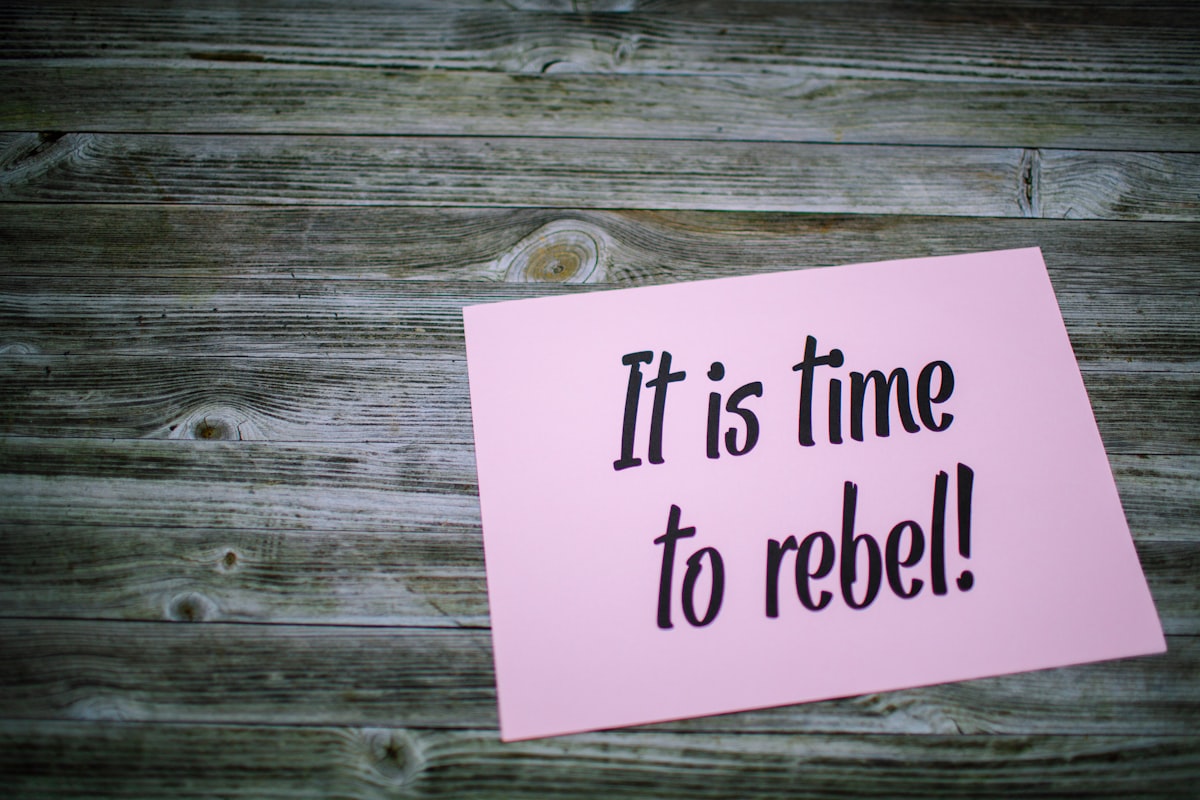Early Review: A Rebel’s Manifesto by Sean McDowell
Sean McDowell's new book aims to help students engage culture from a Chrisitian worldview. Does it hit the mark?

Releasing July 5, 2022, from Tyndale. Scroll to the bottom for a final score and link to purchase.
If you have a young adult struggling with how to engage the world as a Christian, you should hand him Sean McDowell’s new book, A Rebel’s Manifesto: Choosing Truth, Real Justice, and Love amid the Noise of Today’s World. With that recommendation out of the way, I want to overview the book, point out some positives and negatives, and tell you why I think it hits the mark it’s aiming for.
What’s It About?
McDowell’s new book is primarily aimed at teens and young adults who are Christians but are struggling with what it means to live Christianly in the world. McDowell’s book is broken into 26 quick eight to ten-page chapters and so it cannot be a deep dive into any particular topic. It is, rather, a look at how Christians should approach various important cultural topics.
McDowell opens the book with Part 1, entitled “The Challenge.” He covers the basics of the Gospel and basic principles of being a Christian (loving our neighbors, thinking Christianly), and gives a defense of judging others while being aware of our own potential hypocrisy.
In the second part of the book, McDowell opens up into his primary format of engaging with a particular issue from a Christian perspective to encourage students to confidently engage culture as an outgrowth of their Christianity. Part 2 is “Culture” and covers topics like smartphones, social media, and politics. Part 3 covers “Relationships” such as the epidemic of loneliness, suicide, and racial tensions. Part 4 is “Sexuality,” covering sex, homosexuality, transgenderism, and more. Part 5 is “Ethics,” and covers the environment, guns and violence, immigration, and more. The final section is “Cultural Engagement” and talks about how students should approach knowing God’s will and how to have conversations with non-Christians.
Hopefully, that gives you a broad idea of what the book covers and how it does so. Below will be a more critical engagement with the ideas in the book.
Critical Review
General Thoughts
The word “manifesto” has some negative cultural baggage, as mass shooters have published manifestos to explain the reason for their evil and violence. As a “public declaration of intentions,” it works, but I’m not sure if the negative connotations of the title A Rebel’s Manifesto will work against the book or not.
I do wish that McDowell has provided a “further reading” section for each chapter where students could go if they wanted a deeper dive into any particular topic. McDowell looks at these topics from a critical worldview point of view, and not a biblical-theological point of view (my bent), which I think weakens the book in some areas and results in McDowell either telling the reader what the Bible says about a topic or laying out options and providing his input. Don’t mistake me, he cites scripture in support of his points, but much more can be said about each of the topics he covers. Because I agree with the large majority of his conclusions, and because of the brief and broad nature of the book, I can’t fault him too deeply.

In this section of my review, I will be critiquing and praising this book in equal measure, but I want to make this clear: I have found far more to praise in this book than critique.
Part 1: “The Challenge”
Over the last few years, I have been increasingly alarmed by the lack of love in the American Evangelical Church (of which I call myself a part) for our neighbors who don’t think like us. The increasing political radicalization of the church is one of the greatest internal dangers and a profound turn-off for many of the young people that McDowell is trying to reach in this book. In his chapter, “Loving My Neighbor,” McDowell starts a pattern that is often repeated throughout this book: love your neighbors, even those you disagree with or that are not like you.
As the second of the two greatest commandments, I’m so grateful to see this emphasized so deeply in this book. Despite any other criticisms I have with this book, the repeated theme and tone of love, grace, and charity for all is perhaps the primary reason I’d recommend this book to any student or student pastor. The next generation cannot be politically radicalized, they must be radicalized to love.
…When someone is transformed by God’s mercy, they will extend that mercy to others. Therefore, a failure to grant mercy to others reveals don’t truly grasp the depth of God’s mercy to us.
— A Rebel’s Manifesto, Sean McDowell, 21 (pre-release)
In this section of my review, I will be critiquing and praising this book in equal measure, but I want to make this clear: I have found far more to praise in this book than critique.
Not all is perfect, of course. In Chapter 4, “Thinking Christianly,” McDowell writes,
Most people seem to adopt their worldview without serious reflection (which may have been one reason Jesus called people sheep!)
— Manifesto, 28
This fits a traditional narrative I’ve seen in some evangelical churches: “Lions, not Sheep.” The idea is that Jesus calls us to be roaring lions for our (usually political) beliefs, and everyone else led astray by political rivals are “sheep.” I don’t think McDowell intends it this way, but it does fit that narrative. But the Messiah calls his people sheep (Matt. 9:36, 10:6, 16, 18:12, 25:33, 26:31, to quote just one gospel). We are called to be sheep.

Part 2: Culture
Cultural commentator (and non-Christian) Jonathan Haidt has argued that smartphones and social media have made American culture “uniquely stupid” in the history of western civilization in the last 10–15 years. McDowell tackles the topic in Chapter 6. I truly hope that this chapter will encourage some students to put down their smartphones and engage with their family, church family, friends, and those they disagree with in real life.
Chapter 8 tackles politics, and I was eager to see McDowell’s approach to this chapter. If social media has made this time in American life uniquely stupid, then what it has primarily made stupid is our politics.
The next great rift in the American church will not be theological but political. Both sides will largely agree on theology, but the fundamentalist side will increasingly marry right-wing politics with Christian belief and the evangelical side will increasingly ignore or disassociate with those politics. Both sides will find the other objectionable.
McDowell doesn’t write about this rift, but he does provide a helpful corrective to the increasingly polarized words that Christians engage with. McDowell’s first section of the chapter is “Leading with Charity” and another is “Avoiding Extremes.” McDowell provides these four takeaways:
1. Realize that every news source has a bias.
2. Recognize that the modern practice of politics is driven by emotion.
3. Study both sides of an issue.
4. Make sure you are motivated by love.
— Manifesto, 73
Amen to that!

Part 3: Relationships
In part 3, McDowell tackles topics like loneliness, bullying, and racial tensions. I love McDowell’s application of justice to the topic of bullying. He writes,
As Christians, we are called to care about justice and to defend the oppressed. Jesus cared for the marginalized in his society…James says to care about…two more marginalized groups (see James 1:27). Why care about “lowly” people rejected by society? Because, as we’ve talked about often in this book, every human being is made in the image of God and deserves dignity, honor, and respect.
— Manifesto, 97
To that, I say, Amen!
Later, however, McDowell argues that we ought to defend ourselves from bullying "when there is no other option." I worry that this will lead to violence and potential danger for the bullied. There is almost always another option. Talk to a friend, a parent, a pastor, or another authority who shows the love of Christ. The teachings of Jesus make it clear that our response to hatred should be to pray and love our enemies, not to fight back.
In Chapter 14, McDowell writes about “Racial Tension.” He admits that in an earlier edition of this book, he didn’t write about race, not because it wasn’t important, but because, as a member of the majority race, it didn’t “cross his mind.” This is commendable honesty and vulnerability.
Overall, I liked his chapter on racial tensions. He acknowledges that we have made progress but that too many have ignored America’s “checkered past.” I can’t tell you how many (white) Christians I have heard talk about how America is so deep in sin now unlike in the past. When I point out that white Americans owned, raped, and murdered slaves for centuries during the supposed “Christian” period of America’s past, I often get either embarrassment or silence in response. Christians must do a better job of remembering our history, the good and bad.
Christians must do a better job of remembering our history, the good and bad.
I want to encourage people with McDowell’s first takeaway,
1. Build relationships with people of different ethnicities. It is easy, and natural, to make friends with people who are like you. Be different. Reach out to people of different races and get to know them as friends. Be eager to hear and learn about their life experiences.
— Manifesto, 124
Part 4: Sexuality
Christians have always been sexual revolutionaries. In this section, McDowell encourages Christian students that living in the Biblical sexual ethic is best for our flourishing as people and our long-term happiness (even if it requires celibacy in this life).
While largely great, my biggest criticism of the book comes in this section. In Chapter 16, “Homosexuality,” McDowell opens with the story of Rachel Gilson, a former atheist lesbian who turned to Christ and renounced her homosexuality at great personal cost and difficulty. Although critical of living a homosexual lifestyle, this framing of Gilson’s story helps us to feel compassion for those with homosexual desires.
However, the next chapter isn’t called “Transgenderism.” It’s called “Transgender Ideology,” and the opening framing isn’t about someone who has struggled with gender dysphoria, but about an atheist feminist who has been hurt by advocates of transgenderism because she disagrees with the concept of transgender ideology. This framing is jarring, especially when compared to the previous chapter.
Although there is much good in the chapter, including a reminder that American ideas about masculinity and femininity do not equate with Biblical masculinity and femininity, the chapter title and early framing set up an adversarial relationship in a concerning way that wasn’t there in the chapter on homosexuality. In this book, homosexuals are framed as people loved by God, and while McDowell does talk about loving transgender individuals, the chapter is focused on resisting transgender ideology. It could have been framed better.

Part 5: Ethics
This eclectic section covers topics like environmentalism, poverty, and guns.
These topics are controversial within the American evangelical church because they are often so politically loaded. To be “in the tribe” usually requires adhering to one particular side of these various beliefs. McDowell does a good job in general of approaching each of these.
McDowell rightly emphasizes that Christians are called to care for the poor and that many ignore that call.
In the chapter on poverty, McDowell rightly points out that poverty often doesn’t manifest merely as physical lack, but also as psychological hopelessness and depression. However, he also includes a brief apologetic for capitalism and anti-socialism, which feels out of place. Still, McDowell rightly emphasizes that Christians are called to care for the poor and that many ignore that call.
Chapter 22 covers guns and violence. As someone leaning on the spectrum away from just war and violent self-defense, and toward Christian non-violence, I suspected that I would disagree with McDowell’s conclusions here, and I was right. However, I was surprised that this is one of McDowell’s most theological chapters. He briefly engages both the case for non-violence and self-defense. While he ultimately leans toward self-defense, it does feel just like that, a leaning, not a hard position, which I appreciated.
Part 6: Cultural Engagement
The shortest part of this book, this section covers how Christians should approach knowing God’s will for our lives and how to have productive and charitable conversations with those we disagree with. Both these chapters were excellent, Biblical, and sorely needed. My only nit to pick is on the chapter with conversations. I wish that McDowell had mentioned open-mindedness and the ability to change our beliefs on secondary issues.
On most of the issues discussed in this book, Christians should hold their views with an open hand and be willing to change their minds in light of new evidence. That doesn’t mean that we should be wishy-washy and change our minds constantly, but it does mean that if the views—again, on secondary matters—you were taught as a child are exactly those you hold as an adult, you may be closed-minded or not engaging well with opposing views. Not always, but it could be the case.
Students should not be bullied or pressured into changing their views, and Christians can never abandon the core tenets of the faith, such as the deity and resurrection of Jesus, the triune nature of God, and that Jesus is coming again. But on issues like immigration, gun control, and approaches to politics, there ought to be freedom to discuss in good faith and change our minds.
Summary and Score
I have criticisms of this book. I disagree with McDowell on some issues of theology and ethics. I don’t like how he approached the topic of “Transgender Ideology.” Nevertheless, the resounding call of the book to love, grace, and empathy (though I don’t believe McDowell ever uses that word) as Christians engage with the world is one I can wholeheartedly support.
If you are a student, parent of a student, or student pastor, I recommend getting this book into the hands of your student. Better yet, read a chapter per day with them (it will take 5–10 minutes!) and then have a 15-minute conversation about it.

A Rebel's Manifesto by Sean McDowell
Following Jesus has never been harder. In a culture that glamorizes sex, chases fame, and shames those who don't fall in line, it takes a rebel to be a Christian.
In this book, Sean McDowell aims to encourage and inspire a generation of rebels who will dare to stand up to the madness in a just and loving manner.
